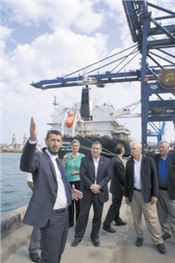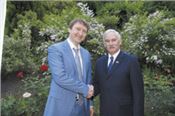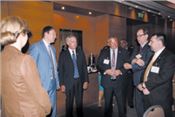|
Trade Abroad

Visiting at the Archer Daniels Midland Grain Facility on the Black Sea in Odessa, Ukraine is left to right
a representative from ADM; Katy Coba, Director Oregon Dept of Agriculture; Doug Goehring,
North Dakota Agriculture Commissioner; in the background Dwight Wilder, Agriculture Attaché,
Foreign Agriculture Service, Kyiv; Michael Scuse USDA ADS and Bill Northey, Iowa Secretary of Agriculture.
Photo by John LaRose
Mission Puts Face With Name, Spurring Market Opportunities
2nd of a 10 Part Series
JOHN M. LAROSE
BETTY VALLE GEGG-NAEGER
MidAmerica Farmer Grower
BUCHAREST, ROMANIA
Leaders from five State Departments of Agriculture and eight U. S. agribusinesses and organizations recently accompanied USDA Acting Deputy Secretary (ADA) Michael Scuse on a trade mission to Eastern Europe to expand export opportunities for U.S. food and agricultural products.
“Lithuania, Ukraine and Romania offer potential as markets for U.S. farm and food products,” ADS Scuse said. “U.S. exports to Romania have been on the rise, and could be further helped by passage of the Transatlantic Trade and Investment Partnership (TTIP). In Ukraine, the continuing economic and political transition could likewise lead to new business opportunities.”
USDA Trade Missions open doors and deliver results for U.S. exporters, giving them the opportunity to gather market intelligence and develop strategies to start or expand their sales in key markets overseas, according to ADS Scuse.
“The past seven years have represented the strongest period for American agricultural exports in the history of our country, with U.S. agricultural product exports totaling $911.4 billion between fiscal years 2009 and 2015,” ADS Scuse said. “In fiscal year 2015, American farmers and ranchers exported $139.7 billion worth of food and agricultural goods to consumers worldwide.”
ADS Scuse commented on the welcome received in all three countries. He said it’s very evident that all three countries are very pleased with the closeness they feel with the United States.
He also commented on a question about how the trade missions connect a particular industry, a particular sector or business in the United States with like chains in foreign nations.
“As an example with the supermarket chains, when you see their shelves filled with American products you realize the opportunity to increase these sales through value added, and that’s extremely important to American agriculture,” he said. “One supermarket we visited provides a huge demand for Alaskan seafood, with this American product leaving a huge American footprint on this particular chain. There were a couple of machinery manufacturers with us on this trip, and with agriculture expanding there will continue to be a need for equipment. Sometimes equipment is different between countries, and just the opportunity to see what we have in the United States can generate sales.”
Many producers in these countries are interested in U.S. genetics, whether for dairy, beef or pork production, to improve the quality of their product, or reduce the time it takes to bring an animal to market. “Also, seed genetics are of a big interest in these countries,” ADS Scuse said. “When we have business-to-business meetings in these counties, there are many opportunities to connect our industries with theirs, especially when they are looking for different or improved products.”
Breaking down the experience in Ukraine, ADS Scuse said there’s a potential for Ukrainian farmers to increase production and increase exports.
“As they do that, there’s going to be a demand for U.S. products, there’s going to be a demand for planting, harvesting, irrigation, grain handling and storage equipment; I think there’ll be a demand for value added processing equipment and seed technology going forward. I think there’s just a lot of an opportunities for American business in the Ukraine.”
“There are economies in areas of the world that are growing quite rapidly, and as they do their middle class grows. As that middle class grows there’s a demand for better products; especially meat, protein products. Then, as that demand grows, you have the demand for grain to feed the livestock industry. So do we need to fear Ukraine? I don’t think so because I think it’s going to take all the major grain producing countries working together to supply the grains for the growing population of the world as well as the growing demand for meat protein.”
According to ADS Scuse, Ukraine’s corn production yield is only about one third of production yield in the United States, making a long way to go to reach current U.S. production. “I don’t think we’re going to stop producing in the United State; I think we’re going to keep improving our production capability so they still have a long way to go in production,” he said. “But there is potential there. When we flew out of Odessa, the one thing that really got my attention was the size of the fields. They are massive, and they have that black soil that has just tremendous potential.”
In the past 25 years, Ukraine has progressed from using crawlers and D6 like tractors to modern rubber tires equipment in the field. Agriculture in Ukraine has changed. If they were to add genetically modified organisms (GMO) to their technology they could experience the same increases in production that U.S. farmers have experienced. The United States has grown from a $10 billion corn crop in 2000 to a $14 billion crop.
“I think if Ukrainian farmers would embrace biotechnology and GMO corns they would see tremendous increases in productivity,” ADS Scuse stated. “It’s not just the genetics, presently they don’t use fertilizer and other best management practices. These would be a major step for them.”
ADS Scuse acknowledged that U.S. farmers could be fearful of helping these countries improve their production and become competitors with American farmers.
“That’s a fair question and it’s one that every farmer has always asked: Why are we doing trade missions? We’re helping them compete against us. I heard it and I actually said it myself when we were dealing with Brazil years ago, but the reality is it’s changed. We are in a world market whether we like it or not and you’re going to have different markets in different areas of the world. We have a huge advantage when you look at many countries because we can transport our product to our port facilities a lot cheaper than a lot of other countries because we have an infrastructure in place to do that. So that’s a major advantage for us versus other countries.”
ADS Scuse was very impressed after having met with the Agriculture leaders in Ukraine. “I think the minister of Agriculture in Ukraine quite frankly was one of the most impressive persons that I’ve met during my travels. He’s very progressive, very forward thinking and he has a vision in many different areas where they need improvement. There’s been a great deal of thought put into all his plans. We were also impressed meeting the Governor of Odessa, Ukraine, and talking with him about his plans and meeting the team of people he has surrounded himself with, very young professional people who want to make the changes and go in the right direction. Seeing everyone that was in place left me just amazed.”
In Romania, the average farm size is nine hectares, it could be a while before they can become an exporter. However, they also have more production capabilities with some large farmers as well.
“I think the Minister indicated there were about four million farmers in Romania, and most of those are very, very small holdings. Some are as small as two hectares. You have the same issue here as in Ukraine, there’s debate about who owns the land and how to do the consolidation. That’s an issue they have to work through.”
Romanians are looking for investment and trade opportunities. There also is a demand for U.S. products. “We have to sell ourselves. We’re going to have to help create that demand but that’s why you visit with representatives of five State Departments of Agriculture and you come with the business community to help create that demand for products. When you look at what we have to offer in whole different areas – whether its production capabilities, our genetics, farm machinery, packaging equipment – the United States has an awful lot to offer. We have fruits and vegetables at different times of the year that may not correspond to times when theirs are available. So there are some opportunities for U.S. agriculture as well.”
Face to face meetings helps to establish relationships and facilitates further dialogue.
“Yes it does,” he agreed. “I’ve met three different Ministers from Ukraine and the U.S. Ambassadors who have wanted us to come over and visit their country, so I think it’s been important that we came with the delegation and visited all three countries. In my view, it’s been an outstanding trip and I think at the end of the day it’s going to open doors for U.S. agriculture,” stated ADS Scuse.
ADS Scuse didn’t have to think long to come up with a description of his feelings about the entire trip.
“While I actually anticipated it to be a very good informative trip, I think the reception that we received, and especially from the government officials in all three countries, which I expected to be really good, exceeded my expectations. We had very positive meetings with the government officials in all three countries and the people that are in place, the qualifications, the commitment they have in all three countries has been quite impressive.”
ADS Scuse also said the government-to-government meetings held in each country were absolutely amazing. He praised the support offered by these three countries for the United States and the great relationship this country has with Lithuania, Ukraine and Romania is mutually appreciated.
“So it has been a really good trip and I think at the end of the day we have made some very new friends, we’ve improved our already great relationships with the three countries and we’re looking to being able to market more products and do bilateral trade and investment in all three countries. I think when it’s all said and done, these are going to be very, very good connections for us all.” ∆
Editors Note: Next Weeks Articles Are; Forged Friendships Bring Rewards To U.S., Romania and a second article Foreign Agriculture Service is U.S. Link To The World
JOHN M. LAROSE: Publisher MidAmerica Farmer Grower
BETTY VALLE GEGG-NAEGER: Senior Staff Writer, MidAmerica Farmer Grower

During a USDA hosted reception at the Chief of Mission’s Residence in Kyiv, Ukraine is
left Taras Kutouyi, Ukraine Miister of Agriculture and Michael Scuse USDA Acting Deputy Secretary of Agriculture.

Visiting at the Conference Center is left to right Taras Kutouyi Minister of Agriculture Ukraine;
USDA ADS Michael Scuse; Bill Northey, Iowa Secretary of Agriculture;
Frederickson, Minnesota Commissioner of Agriculture and Angel Velitchkov, Counsel for International
Trade, Nebraska Department of Agriculture.
|
|